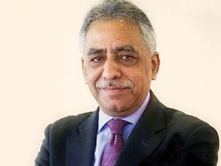Alumni Interview- Muhammad Zubair

1. What led you to leave a successful corporate career and join politics?
I joined IBM immediately after graduating from IBA in 1981. Having served more than 26 years, I had been thinking of doing something different. I was happy with IBM. I wanted to have a feel of something different than the usual corporate stuff. And I wanted to finally settle in Pakistan. When I took the decision to resign, I had no specific idea of what to do. Resigned and came back to Pakistan. Joining politics was not intentional. It resulted after a chance meeting with then CM Punjab. I took less than an hour to take the decision to join politics. I thought I was fortunate to have the offer from a leading political party. The rest as they say is history.
2. Do you think your professional career helped you perform better while holding governmental offices?
Absolutely. My educational background and professional background were the key towards my performance in the govt. the management skills that I learned in my professional career helped me immensely. Government needs to induct more professionals to improve its working capacity.

3. What have been your biggest challenges in the political arena?
As someone who has had a career in the corporate world, then a bit of business experience and finally politics, I can say that the most challenging is politics. Unlike the corporate and business world, politics is rough and tough. You have all kinds of people in a political party as there are no qualifications for joining a political party. And one has to deal with all these people with different educational backgrounds, different in just about every way. There are outstanding people but there are also extremely poor quality people. You need the art to connect with every segment of the population- rich, poor, middle class, professionals, non-professionals, etc etc. From the comfort of travelling financial hubs like Hong Kong, Singapore New York, London etc, one has to learn to travel to places like Larkana, Dadu, Remote villages in Baluchistan and so on. How well one can connect will finally help you in your political career. Challenges are there but I have enjoyed each moment.
4. Do you feel that an educated, middle class person can survive in Pakistani political setup?
Not just survive but in most cases flourish in politics. Educated, middle class people can certainly create their own space with intelligence, creativity and hard work. There will always be frustrations and people challenging you but if one is committed, all obstacles can be overcome. Already there are examples of many educated middle class people having made a mark in politics.
5. If given a chance, would you want to go back to the corporate sector?
Would love to but I guess it's late now.
6. Belonging to a family of high achievers, how difficult was it to live up to the family name?
We were brought up in a manner expecting us to perform at the very best. Our father was a general, so there was already a role model. Somehow we had a clear path sort of defined. IBA and then corporate world. My brother Muneer Kamal was the first to graduate from IBA and joined Citi Bank - a prized job for any business graduate. He also contested election to the IBA board of governors as student rep and won. I was expected to follow a similar path. I also contested and won the Iba board of directors election. Graduated and was lucky to get job with IBM - at that time the best corporate in the world. And finally the youngest Asad Umar graduated in 1984 and joined Exxon - another outstanding American corporate. Asad was not so lucky with the elections. Fought but lost.
This healthy competition remained throughout our careers. My brothers set high standards that were always difficult to follow but they helped in achieving my own benchmarks. I can say I have been lucky to have such high profile family members. In fact very proud to be part of such high achievers.

7. Do you believe that leaders aren't born, they are made? If yes, how do you know you're prepared to be a leader?
I don't think leaders are born. There are circumstances and opportunities that create a leader. From my own experience I can say people are not born as leaders with few exceptions of course.
8. How do you give back to the society? What is your philosophy and how do you make it happen?
Any person who has had a successful career in any capacity, must give back to society in some form. Politics is also a way to give back what one has learned in your professional career. Other areas where one can contribute is through charity or social work.
9. If you could change one thing about your life, in the past or present, what would that be? Any regrets?
No regrets at all.
